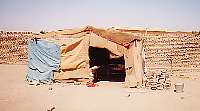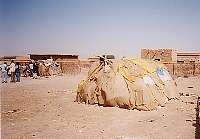 From October 19-25 a delegation of the Community of Sant'Egidio was in Khartoum to
bring emergency aid to a group of families that had remained homeless because of
the overflowing of the Nile River last September.
From October 19-25 a delegation of the Community of Sant'Egidio was in Khartoum to
bring emergency aid to a group of families that had remained homeless because of
the overflowing of the Nile River last September.
The project was initiated following a request from the Archbishop of Khartoum, Gabriel Zubeir Wako. It was addressed to the Community during early October. Assistance from the Community was destined for the 2,370 families living in some areas of the capital and of northern Sudan, along the banks of the Nile.
The custom of building houses close to the Nile is widespread in the Sudan because of the better quality of the land and of the climate near the river. Furthermore, given the desert nature of the country, it is easier to make use of the water for cultivation closer to the river. During recent years, however, the rising and overflowing of the river has been particularly frequent, and this has led a great number of families to find themselves without a home.
 On the occasion of the latest flood, approximately 10,000 persons remained homeless and were scattered in many of the outlying neighborhoods of Khartoum, building shanties or even living in lean to tents, also far from water and without sanitary services.
On the occasion of the latest flood, approximately 10,000 persons remained homeless and were scattered in many of the outlying neighborhoods of Khartoum, building shanties or even living in lean to tents, also far from water and without sanitary services.
Notwithstanding the fact that we deal with disadvantaged places, many persons, in order to guarantee that their shacks are not destroyed, have decided to build on land belonging to private individuals and must pay rent to the owner of the land that they occupy. For this reason it is not uncommon to see fenced in land with one or more shacks.
We have seen some of these areas, especially in the more highly populated neighborhoods of Kalakala on the outskirts of southern Khartoum and we could see for ourselves the difficulty of the life of these persons who live in makeshift dwellings in typically desert climates, characterized by suffocating heat during the day and piercing cold during the night.
We have met many of these families. The greater part of them come from the southern part of the nation from where they have escaped some time ago fleeing from civil war. During our stay in Sudan, we started the project of emergency assistance with the office for Human Advancement of the Diocese of Khartoum.
 With those responsible for the office, we visited some places where our aid would be sent. We saw to the ordering of material and examined the samples of the material that would constitute the emergency aid.
With those responsible for the office, we visited some places where our aid would be sent. We saw to the ordering of material and examined the samples of the material that would constitute the emergency aid.
Each family will receive large pieces of plastic material to cover their tent or shanty, some blankets, oil and grain. They will also receive containers to transport water and oil. This assistance will allow each family to live through the early period with minor difficulty while they await a more definitive solution.
The Community has also taken on the expense of the transportation and storage of materials. These will be distributed by some parishes of the Khartoum Diocese by November 10. By that date all families will have received help from the Community.
In addition to the content of the project, which responds to the primary needs of a rather wide population, both Bishop Zubeir and those responsible for the humanitarian aid in the Diocese of Khartoum have shown their appreciation for the promptness with which the Community has placed at their disposition the funds and the speed with which the project was put into effect.
This was, in fact, a project of genuine emergency that was dealt with in a very efficacious manner.
It met the needs of a population in a very short time.
Fabio
Riccardi

